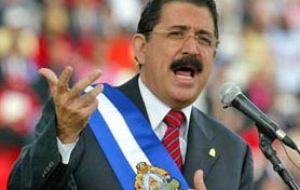MercoPress. South Atlantic News Agency
President Zelaya voted in as Liberal turned into ally of Chavez’ ALBA
 Zelaya’s party turned back on him when he sponsored a re-election proposal
Zelaya’s party turned back on him when he sponsored a re-election proposal Jose Manuel Zelaya was elected Honduran president in November 2005 running as the Liberal Party candidate. Despite his centre-right credentials, the former businessman and civil engineer with logging and ranching interests moved Honduras away from its traditional ally the US, winning the support of Venezuelan President Hugo Chavez and other left-leaning leaders.
Limited to a single four-year term in office under the current constitution, he was accused of seeking to change the law to allow him to stand for a second term.
Mr Zelaya won 46.17% of the vote in 2005 to 49.90% for Porfirio Lobo of the ruling National Party. He pledged to tackle gang warfare and poverty in one of Central America's poorest nations. But food prices rose and violent crime continued.
Publicly backed by Mr Chavez, Bolivian President Evo Morales and former Cuban leader Fidel Castro, Mr Zelaya began to lose the support of his own party.
In May 2007, Mr Zelaya ordered all of the country's TV and radio stations to carry government propaganda for two hours a day, accusing them of giving his government unfair coverage.
In August 2008, he took Honduras into the Bolivarian Alternative for the Americas (Alba), an organisation set up by Venezuela as an alternative to the stalled US plan for a Free Trade Area of the Americas.
Mr Zelaya's decision to hold a national poll on whether or not to run a referendum on allowing a Honduran president to run for two consecutive terms angered many.
Actually his popularity among Latinamerican most prominent radicals raised, so did questions at home about the man who had been elected as a Liberal.
His arrest came just before the start of a referendum ruled illegal by the Supreme Court and opposed by Congress. There had also been resistance within Mr Zelaya's own party to the plan for the vote.
The military's dramatic move came after President Zelaya sacked the chief of the army, Gen Romeo Vasquez, on Wednesday for refusing to help him organise the referendum.
A day later, the Honduran Congress approved plans to investigate whether the president should be declared unfit to rule.
Venezuela, Ecuador and Bolivia reformed their constitutions to enable presidential re-election.
The Central American country of 7 million people, one of Latinamerica’s poorest countries which lives of coffee and banana exports, plus international aid, has a turbulent political history and in the past experienced military coups.
According to the latest news from Tegucigalpa, Congress swiftly appointed its speaker Roberto Micheletti - a member of Mr Zelaya's Liberal Party, but an opponent of him - as acting head of state.




Top Comments
Disclaimer & comment rulesCommenting for this story is now closed.
If you have a Facebook account, become a fan and comment on our Facebook Page!